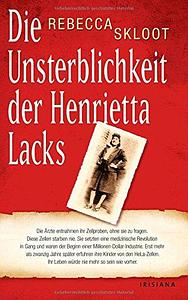You need to sign in or sign up before continuing.
Take a photo of a barcode or cover
obviously this book is a 5/5. An incredible event from history humanized in the most unexpected ways.
dark
emotional
informative
medium-paced
"It sounds strange," he said, "but her cells done lived longer than her memory."
For all that Henrietta Lacks and her immortal HeLa cells contributed to science, little of her life and identity in general was previously known, until Rebecca Skloot started digging deeper. This is an informative and emotional memoir of a woman whose cells continue to be an important part of scientific discoveries & treatments. But beyond that, this is a memoir of a woman who was wronged in a lot of ways in the medical community, who suffered from systemic racism, and had joy, pain, kindness, humanity and a voice that was buried underneath bureaucracy, dismissal, and unethical behavior, unfortunately rife in such a vital discipline.
Rebecca Skloot uncovers much of how — behind the important work that scientists did in the past — greed and capitalism manage to leverage medical discoveries for profit. Ironically, while HeLa cells started being utilized for life-changing research, Lacks' family was completely unaware of this and could not afford healthcare themselves. Skloot's observations and descriptions are researched well, and it's clear from her thoughtful prose that her relationship with Lack's daughter, Deborah, and other family members is very meaningful to her.
Henrietta Lacks isn't a name I've heard until fairly recently and sadly, many in the medical field aren't even aware of her story. This is a moving biography that I think is a must-read for everyone.
For all that Henrietta Lacks and her immortal HeLa cells contributed to science, little of her life and identity in general was previously known, until Rebecca Skloot started digging deeper. This is an informative and emotional memoir of a woman whose cells continue to be an important part of scientific discoveries & treatments. But beyond that, this is a memoir of a woman who was wronged in a lot of ways in the medical community, who suffered from systemic racism, and had joy, pain, kindness, humanity and a voice that was buried underneath bureaucracy, dismissal, and unethical behavior, unfortunately rife in such a vital discipline.
Rebecca Skloot uncovers much of how — behind the important work that scientists did in the past — greed and capitalism manage to leverage medical discoveries for profit. Ironically, while HeLa cells started being utilized for life-changing research, Lacks' family was completely unaware of this and could not afford healthcare themselves. Skloot's observations and descriptions are researched well, and it's clear from her thoughtful prose that her relationship with Lack's daughter, Deborah, and other family members is very meaningful to her.
Henrietta Lacks isn't a name I've heard until fairly recently and sadly, many in the medical field aren't even aware of her story. This is a moving biography that I think is a must-read for everyone.
funny
informative
mysterious
reflective
fast-paced
emotional
informative
medium-paced
This book was amazing. Before I started I was worried it would be too science heavy and complex for me to finish but wow the author explained everything so well and the personal stories throughout really kept me engaged. Cried multiple times. Such a powerful book, everyone should read it!
medium-paced
informative
inspiring
medium-paced
I loved the biology part of this book and I love that Henrietta Lacks story continues to be told. I’m just not the biggest on non-fiction and I had to read it for school which probably contributes to its star rating. I would have never picked out this book on its own but I found it really interesting and I think it’s a good read.
emotional
informative
medium-paced
⭐️⭐️⭐️⭐️⭐️ (5 stars)
I don’t read a lot of nonfiction — but The Immortal Life of Henrietta Lacks by Rebecca Skloot completely floored me.
This book tells the true story of Henrietta Lacks, a Black woman whose cancer cells were taken without her knowledge in the 1950s. Those cells — known as HeLa cells — became the foundation for some of the most important advancements in modern medicine: the polio vaccine, cancer research, IVF, gene mapping, and more.
But what really stunned me wasn’t just the science or the history — it was the total breakdown of communication between the doctors, researchers, and Henrietta’s family. For decades, no one stopped to make sure the family actually understood what was happening with Henrietta’s cells or why. Doctors spoke in medical terms. Researchers assumed the family knew more than they did. And the family? They were left in the dark, confused, mistrustful, and feeling exploited.
At one point, they even believed their mother might still be alive through her cells — and no one bothered to explain otherwise. It was heartbreaking. And honestly? Infuriating.
What I loved most is how this book never loses sight of the person behind the science. Henrietta wasn’t just a cell line — she was a mother, a wife, a woman with a life and a family. And I loved how her daughter, Deborah, ends up becoming this bridge between the family and the scientific community — even though it took fifty years to get there. That human connection, that emotional core, is what really makes this book stand out.
Yes, some chapters dive deep into the science and medical history, and I totally get that might feel heavy for some readers. But honestly? I think those sections are important. The author does a great job explaining things in a way that’s accessible — and it helped me understand just how huge this story really is.
If you’re looking for a nonfiction read that feels personal, thought-provoking, and surprisingly emotional, I can’t recommend this one enough. It changed the way I think about medical ethics, patient rights, and how much of a difference honest communication really makes — in science, in medicine, and in life.
This is a story that still matters. And I think everyone should read it.




